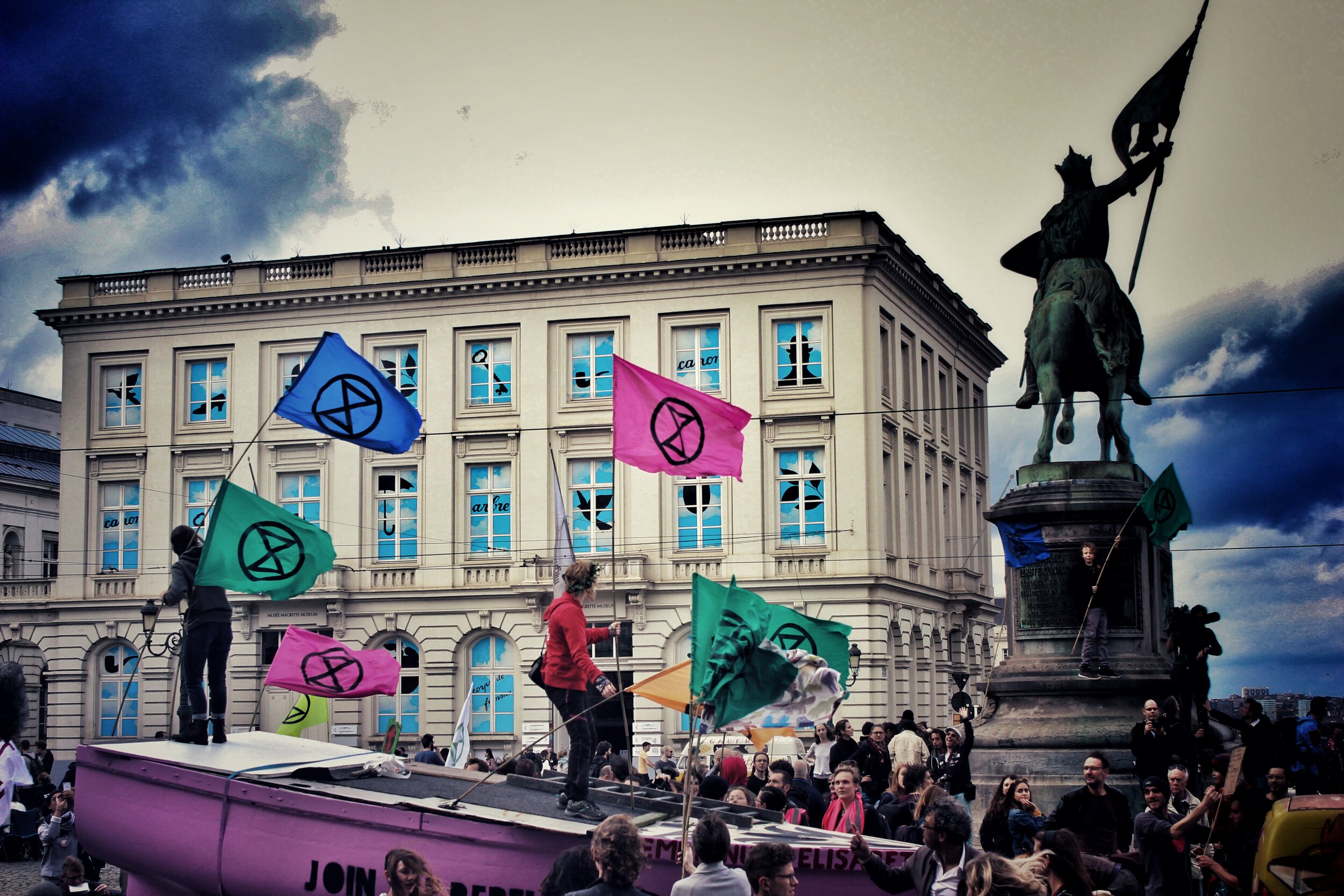Extinction Rebellion - Picture by ©Heleni Smuha
On Saturday October 12th, the international climate justice movement Extinction Rebellion (XR) planned its first mass mobilization action on Belgian soil. In an attempt to understand the organization’s motives and the accusations of police violence, we get into a protester’s mind.
BY HELENI SMUHA
BRUSSELS, OCTOBER 12, 2019 The grassroots movement Extinction Rebellion is organized in a horizontal way and plans non-violent actions of civil disobedience in an attempt to turn around the government’s lax attitude regarding the current climate and environmental emergency. Convinced that the crisis calls for more radical strategies, Extinction Rebellion applies direct action as a main strategy, which has been proven effective in many other social justice movements throughout history. They are prepared to face arrests to change the current political system into one that takes the climate crisis seriously. The movement announced a worldwide ‘week of rebellion’ starting October 7th and actions in 60 cities all over the world were planned.
For the first mass action in Belgium, the rebels planned on occupying the royal garden for 24 hours and organize popular assemblies, musical performances and potluck meals. Stickers, posters and graffiti were spread all over the nation, inviting citizens to peacefully join the citizens’ assemblies. These assemblies consisted of small discussion groups in Dutch, French and English on various topics from the role of education in the battle for global warming to alternative ways of consumption. Activists also invited King Philippe to join the action that came to be known as the ‘Royal Rebellion’.
E.g. the American Civil Rights movement, the Suffragettes and ACT UP (AIDS Coalition to Unleash Power).
The invitation letter – which a few activists attempted to hand-deliver to the King – commenced with the poetic words “Sire, your Kingdom is burning.” They called upon him to officially declare the nation as being in a state of climate emergency. With the Royal Rebellion action, the militants also demanded government officials to take proportionate measures in order to tackle this crisis.
Saturday at 2 pm, over a thousand participants spontaneously gathered at the square Place Royale nearby the royal garden, since the police had blocked all access to the latter, it being a Neutral Zone. The XR activists carried banners, musical instruments, sleeping bags as well as chairs for the popular assemblies. Colorful flags with the XR logo – an encircled hourglass – peacefully floated in the city’s calm breeze.
The circle of the XR logo represents planet Earth while the hourglass refers to the urgency of saving it.
The square quickly filled up with people of all ages and linguistic backgrounds. The rebels merged into hopeful encounters where everyone’s voice was encouraged to be raised and heard. The peaceful and organized dialogues embodied their adherence to direct democracy.
As opposed to ‘representative democracies, direct or ‘pure’ democracy is a form of democratic decision making where citizens are asked to participate by voting directly on specific issues instead of on people or parties. (Theo Schiller, the Encyclopædia Britannica Inc.)
At around 3 pm that Saturday, a group of militants proposed a first attempt to reach the royal garden by climbing the fence of the park situated across of it. A group of approximately forty people gathered in the park to collectively discuss the action’s strategy, using the hand signals taught at the XR briefings. Shortly after, over a hundred people climbed the fence in affinity groups of seven to ten people with the slogan “there is no neutral zone on a dead planet” echoing in our ears. Police officers awaited with barking dogs, pepper spray and pushing. One hundred and thirteen of us managed to peacefully walk towards the entrance of the garden and performed a sit-in. The police quickly encircled us and at 16h20 Pierre Vandersmissen (Head of the Brussels police force known for his rough methods against demonstrators announced the immediate mass arrest of all present XR activists. I couldn’t help but chuckle upon hearing the words 4:20 coming out of a police officer’s mouth.
Refers to a date (April 20th) and time (4:20 pm) where the smoking of cannabis is celebrated in cannabis-culture.
screenshot ©Gieljan Van Goethem
As we sat there waiting to be handcuffed and brought to the station (a very slow process), small acts of solidarity affirmed Extinction Rebellion’s regenerative culture. Activists passed around eye drops (preemptively gifted by the Red Cross) to ease pepper spray stings and made sure their comrades were well. We gathered each other’s names to warn members of the XR’s legal assistance – whose phone numbers were written on our arms – of our arrest and cheered every new protester climbing the fence while we were loaded into busses one by one. The police forces seemed rather disorganized. “What should I do with her?” one hesitantly asks another after having body-searched and handcuffed me. While some police officers looked rather angry, others seemed ashamed of their behavior. An XR militant suddenly rose from the crowd up from the crowd, holding up a banner that read, “Police officers have children, too. We are also doing this for them.”
A suffocatingly hot bus ride, red wrists, a waffle and a plastic (oh the irony) water bottle later, we were brought to large grey cells in groups of ten to twenty people, men and women were separated. For many women in my cell, it was their first arrest and for some even their first demonstration. We all came from different parts of the country and communicated in English, so that the majority would understand. I don’t think I have ever witnessed as many exchanges between Flemish and French speakers as in that cell. The action had thus managed to dissipate the Belgian’s main division: its linguistic barrier. Experienced climate militants expressed their excitement in light of the growing number of people new wave invested in the struggle for social and environmental justice.
screenshot ©Gieljan Van Goethem
The cell ironically became a place of liberation from our daily obligations and responsibilities. We took the most possible advantage of our time being locked-up: we shared experiences, opinions and projects, held yoga and meditation sessions and sporadically shouted climate justice rallying cries which were enthusiastically echoed by our allies in nearby cells.
It did not take long before we realized that we were part of the lucky participants, the ones who were treated the less violently. Every few hours, one or two new climate rebels were placed in our cell and informed us of the Rebellion’s development. We gathered around them with curious eyes like children around a storyteller on Halloween. A few newcomers entered coverall garments given to them by the guards because their clothes were dripping wet. They described the police’s disproportionate, brutal and intimidating behavior. At 6 pm, they had encircled the action’s Safe Zone. Heavily armored, they attacked the peaceful protesters – including children and elderlies – with pepper spray, batons and a water canon. Upon hearing this, we cynically asked ourselves, “Were they, perhaps, singing too loud?”. With police closing up on the activists on the square, few people were able escape the situation and over 300 administrative arrests were carried out. Whereas the first 133 militants who were arrested in the Neutral Zone had consciously decided to use their privilege – as mostly white, middle class, non-parents – to sacrifice a few hours of freedom, the rebels at Place Royale, as well as a few unlucky passing tourists, did not make that choice. They were thus unwillingly taken away. Taking into account the aggressive nature of the ambush, is hard to believe that Vandersmissen’s intention was to merely evacuate the square.
The police eventually started releasing the first arrested activists at around 11 pm, transporting them in small groups to the five different corners of the city. For some, the road home was still long, with the first trains departing at 5 am.
screenshot ©Gieljan Van Goethem
Over the last few days, XR has gathered testimonies about rebels’ traumatic experiences caused by the police’s emotional and physical power games. The most controversial experience is that of a group of activists who were brought to a garage, and helt there for hours in uncomfortable seating positions. Their plastic wristbands were at no time taken off like official procedure requires, and they were moreover prohibited from speaking and peeing. The bullying and intimidation continued when a male police officer intrusively started riding a motorcycle in the closed garage and making fun of climate activists inhaling CO2. The gasses made one person faint and various people literally peed themselves. More incidents of police bullying were reported, with officers forbidding people to take their prescribed medicine, tightening wristbands even harder upon request to loosen them and reckless driving in the police vans.
Despite the inexcusable police conduct, the big turnout and media attention due to the mass arrests made the Royal Rebellion a success. The violent strategies of the police reveal the state’s fear of what can happen when people unite against injustices. Their attempt to discourage us from organizing and performing our rights to protest and question political decisions has been proven ineffective. If anything, the police’s aggressive tactics were a nice a reminder of the urgency to protect democratic values and rights. Indeed, the twentieth article of the Universal Declaration of Human Rights states that we have the right to protest and peacefully assemble.
“Everyone has the right to freedom of peaceful assembly.”
screenshot ©Gieljan Van Goethem
XR’s faithfulness to non-violence has gained the sympathy of many people, watching the increasingly repressive state actions. Let this be a nice reminder, though, that police officers, too, can (and have!) joined Extinction Rebellion. The movement is inclusive and open to any pacifist civilian supporting radical change in the ways governments are handling the extinction of thousands of species and ecosystems. Let us remind ourselves of what Foucault suggests in his analysis of power dynamics and their way of operating in daily interactions between people and institutions: power is a strategy rather than a possession, and can therefore be appropriated or rendered ineffective.
With different movements facing violent state challenges at the moment, a call to unite in the battle for social and environmental justice is crucial. As such different leftist militant movements including XR, Students for Climate, Plateforme citoyenne de soutien aux réfugiés Bruxelles, The Gilets Jaunes and others, put their hands together to condemn police violence with the demonstration United Against Police Violence which will take place at Brussels’ Grasmarkt/Rue du Marché aux Herbes on Monday October 21st.
As for the future of XR Belgium, debriefs will be organized throughout this and the upcoming week. Anyone who wishes to do so can provide feedback and help brainstorm effective actions to fight climate change through peaceful direct action.
For Rojava, Ecuador, Catalunya and planet Earth.
Love & Rage
screenshot ©Gieljan Van Goethem
screenshot ©Gieljan Van Goethem








